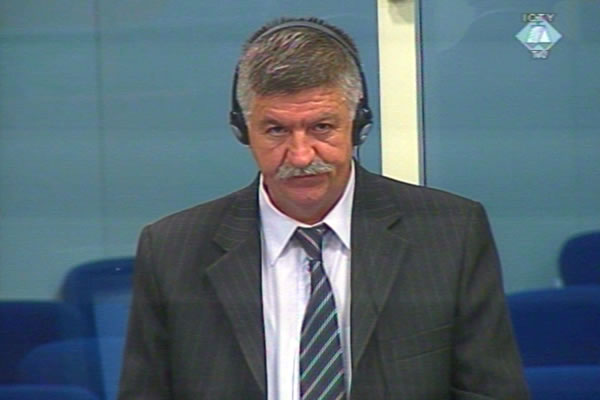Home
KARADZIC'S WITNESS: 'DON'T ASK ME ABOUT ARTILLERY'
In the written statement he gave to Radovan Karadzic's defense, Milos Skrba claimed that the Serb troops manning the positions south of Sarajevo didn't have 120 mm mortars. In the cross-examination, the former VRS commander admitted he had ‘no knowledge of the positions where the mortars were deployed and who used them'
 Milos Skrba, defence witness of Radovan Karadzic
Milos Skrba, defence witness of Radovan Karadzic At the beginning of the hearing, Peter Robinson, Radovan Karadzic's legal representative, complained that a defense witness decided against testifying because he had received 'threats to his family in Sarajevo'. Robinson called the Trial Chamber to 'nip [such problems] in the bud'. The witness purportedly received threats after the defense disclosed his identity last week, together with the names of 16 other witnesses scheduled to testify in November, Robinson said.
After artillery officer Dusan Skrba completed his evidence, Radovan Karadzic called his partial namesake Milos Skrba from Pofalici. Milos Skrba commanded a company in an infantry battalion of the 1st Sarajevo Brigade. The Trial Chamber rejected Skrba's request for protective measures. As Judge Kwon explained, the Trial Chamber was 'not convinced that there are objective risks for his safety and the safety of his family'.
Karadzic read the summary of the witness’s written statement. The witness's unit didn't have snipers, never fired on civilian targets in Sarajevo and had no 120 mm mortars in its area of responsibility. Through Skrba’s evidence, Karadzic is trying to contest two incidents listed in the indictment. Three-year-old Anisa Pita was injured in Zgarici Street in Sirokaca, a housing estate in Sarajevo, on 13 December 1992. A 120 mm mortar shell claimed the lives of 43 persons and injured 75 in the Markale market massacre on 28 August 1995
In the cross-examination, prosecutor Fergal Gaynor confronted the witness with a VRS document which states that the 1st Sarajevo Motorized Brigade had automatic and semi-automatic weapons with optical sights. These weapons were issued to the units which in turn used it on the front lines. Asked if he still claimed that they didn't have snipers, the witness said that his claims were only valid to the unit under his command and not the brigade.
When the prosecutor asked the witness what measures the witness in his capacity as company commander took to minimize civilian casualties, the witness said that the Serb forces 'only' responded to the BH Army fire, firing on clearly visible targets, never randomly. 'Bullets were expensive and there was a shortage’, the witness said.
The prosecution then showed the witness some documents challenging the witness's claim that ‘from the beginning to the end of the war' there were no 120 mm mortars at VRS positions south of Sarajevo.A document of 9 May 1995 signed by SRK commander Dragomir Milosevic states that fire from 120 mm mortars located in the area of Palez on Mount Trebevic would support the attack of Serb forces on Sarajevo. As the witness still claimed that there were no such mortars, the prosecutor noted that Palez was in the area of responsibility of the witness's company.
Skrba finally asked the prosecution not to ask him any more questions about the artillery because he didn't know anything about it. When the prosecutor put it to him that he had no knowledge of the VRS mortar positions, the witness admitted that he had ‘no knowledge of the positions where the mortars were deployed and who used them'.
Linked Reports
- Case : Karadzic
- 2012-10-18 DENYING SNIPER AND ARTILLERY TERROR IN SARAJEVO
- 2012-10-17 KARADZIC 'AMENDS' WITNESS'S STATEMENTS
- 2012-10-17 DEMURENKO DENIES HE ENJOYED SPECIAL TREATMENT FROM VRS
- 2012-10-23 TARGETS OF MODIFIED AIR BOMBS
- 2012-10-23 DENYING SNIPER TERROR ATTACKS FROM SPICASTA STIJENA
- 2012-10-24 PAPOULIAS WILL NOT TESTIFY AT KARADZIC TRIAL
